MercoPress. South Atlantic News Agency
Tag: Argentina
-
Thursday, April 25th 2019 - 21:48 UTC
Economic collapse in Argentina worsens in a volatile day: Macri blames uncertainty
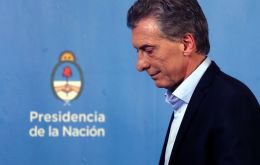
Argentina lived on Thursday another day in which the dollar rebounded and the country risk exceeded 1000 points. President Mauricio Macri criticized the “short-term” view of the markets and the Central Bank (BCRA) had to intervene by positioning the interest rate at 70% and diverting the futures market to contain the demand on the currency, preventing it from reaching the maximum accorded of 51.45 pesos.
-
Thursday, April 25th 2019 - 09:59 UTC
Argentine government admits that political uncertainty is behind the current collapse of economic indexes
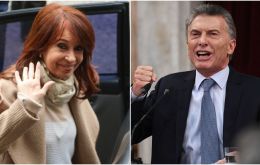
Argentine economy Minister Nicolás Dujovne stated that political uncertainty ahead of the upcoming presidential election this October is the main factor for increases in Argentina's country risk and instability on the exchange markets.
-
Thursday, April 25th 2019 - 09:20 UTC
Brazil and Argentina exports taking over US corn markets
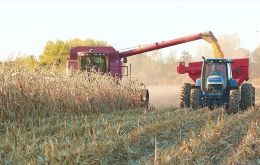
US corn exports are facing increased competition from Brazil and Argentina, the two South American nations that are offering cargoes at competitive prices on the back of high crop output, a trend that could put downward pressure on Chicago corn prices in coming months, analysts said.
-
Wednesday, April 24th 2019 - 11:36 UTC
Argentina trying to sell its soy bumper crop to China

Argentina is pushing to increase agricultural trade with commodities-hungry China, as farmers on the country’s Pampas grains belt prepare for what is expected to be a bumper soybean harvest over the weeks ahead.
-
Wednesday, April 24th 2019 - 09:16 UTC
“Sincerely”, Cristina Fernandez book of anecdotes to be launched on Friday

Two times Argentine president Cristina Fernandez is launching a book next Friday, a collection of personal anecdotes and momentous experiences of her political life, anticipation of its official presentation in the Buenos Aires Book Fair on 9 May.
-
Wednesday, April 24th 2019 - 09:15 UTC
IMF also concerned with the increase in the poverty rate in Argentina

An official with the International Monetary Fund has declared that the increase in the poverty rate in Argentina could force the government to rethink its spending plans and “protect the poor.”
-
Tuesday, April 23rd 2019 - 09:18 UTC
Argentina managed a quarterly primary surplus during the first quarter
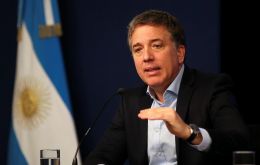
Argentina ran a primary fiscal deficit of 13.037 billion pesos (US$ 305.32 million) in March, the country’s Treasury minister Nicolás Dujovne said at a press conference on Monday, though posted a first-quarter surplus of 10.347 billion pesos.
-
Tuesday, April 23rd 2019 - 09:11 UTC
Bolivia considering exporting natural gas from liquefaction terminals in Argentina

Bolivia is looking at exporting natural gas globally through liquefaction terminals to be built in Argentina, and to buy crude from its southern neighbor, Bolivian President Evo Morales said on Monday, a move that would compensate for dwindling sales of its main export to Argentina and Brazil.
-
Monday, April 22nd 2019 - 09:15 UTC
Argentina’s president attempts to improve his fading chances of re-election (*)

Mauricio Macri's original plan was to address Argentina’s citizens on television on the final working day before the Easter break. But he opted for a folksier way of presenting an economic package that he hopes will rescue his chances of being re-elected president in October. He appeared in a taped video, knocking on the door of a house belonging to a young working-class couple, then sitting down with them to explain his plan.
-
Saturday, April 20th 2019 - 09:21 UTC
Argentina's think tank CARI underlines the significance of China's Belt and Road forum
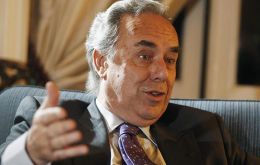
Argentine experts have expressed the belief that the upcoming Belt and Road Forum for International Cooperation can yield more concrete steps for collaboration between China and Latin America. Members of the Asian Affairs Committee at Argentina's Council on International Relations (CARI), a leading think tank, spoke to China's government news agency Xinhua in the lead-up to the forum.
